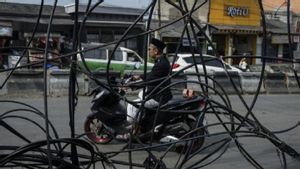JAKARTA - Uploads by actress Tara Basro about the body positivity campaign that shows her naked body attracted the attention of many parties. This is because there is an opinion that the content has violated Article 27 paragraph (1) of the ITE Law on pornographic content. However, not a few also considered that the upload was only a work of art and did not violate the law.
Basically, Tara Basro's uploads aim to invite the public to appreciate more about the shape and appearance of a person's body, especially women, beyond the myth of beauty that is being glorified today. For her, the proportional body and the people's scorn about one's body are considered very toxic, especially for women.
Al-Azhar University Law Expert Suparji Ahmad explained, based on Law number 44 of 2008 Article 4 letter d concerning pornography, all forms containing nudity or displays that suggest nudity, can be said to be pornography.
In addition, when an action or anything that has the potential to stimulate or arouse lust and violate decency, it is also considered a violation of the pornography law.
"Based on the Criminal Code and the Pornography Law, the restrictions violate morality and its implementation if it causes lust," Suparji told VOI, Friday, March 6.
It's just that an action can be said to be a violation of pornography, not measured with limits or limits. Rather, it is determined using analysis and its effects. So, according to Suparji, the boundaries of pornography violations do not have a clear grip and can lead to multiple interpretations related to these limitations.
"So far, the limitation is not done mathematically or quantitatively but tends to be qualitative in nature. So that there can be multiple interpretations," said Suparji.
In the matter of Tara Basro's uploads, he said, the use of art as an excuse cannot immediately invalidate the elements of pornography. Because, it must first be reviewed in general, whether the content meets pornographic elements or not.
"(Regarding reasons of art) the argument cannot be subjective, but must be from the perspective of the general public or the crowd. Because the law is to protect the interests of many people," said Suparji.
Meanwhile, the Institute for Criminal Justice Reform (ICJR) has long criticized the ITE Law, because it is considered to have a 'rubber article'. One of them, Article 27 paragraph (1) of the Law which is due to the unclear definition of 'decency violations'.
The explanation in Article 27 paragraph (1) does not explicitly refer to the provisions of the Criminal Code. Even though in Law no. 19 of 2016 concerning the Revision of the ITE Law states that Article 27 paragraph (3) refers to the provisions of the Criminal Code.
Absolutely, article 27 paragraph (1) must refer to the provisions in Article 281 and Article 282 of the Criminal Code to see the nature of prohibiting the distribution of content violating decency in which the ITE Law reaches the medium in the electronic system.
Regarding the violation of decency, what is considered a criminal act is the act of "intentionally destroying decency / decency in public" or "intentionally destroying decency / decency in front of others, who are present of their own accord".
Decency is a feeling of shame related to sexual lust. And the nature of decency must be judged according to the context of the action.
"Law enforcement officials in the application of this article must carefully assess the measure of decency in the context of the act committed. It must also be ensured that the act was carried out deliberately to destroy the decency," said ICJR researcher Maidina Rahmawati.
He added, for the act of broadcasting, displaying or pasting writings / pictures that violate decency, the Criminal Code explains that the person who commits the act must know that the contents of the writings, pictures, statues and objects made violate feelings of decency / decency.
Whereas in the Pornography Law what is meant by pornography is pictures, sketches, illustrations, photos, writings, voices, sounds, moving pictures, animation, cartoons, conversations, gestures, or other forms of messages through various forms of communication media and / or performances in advance. general, which contains obscenity or sexual exploitation that violates the norms of decency in society.
"At this point, the reassessment of decency is seen from the context of the act committed. Moreover, the politics of law in Indonesia are related to pornography contained in the RKUHP in the explanation of Article 413, that pornography must be seen in the context and not a criminal act if it is a work. arts, culture, sports and / or science, "he said.
The English, Chinese, Japanese, Arabic, and French versions are automatically generated by the AI. So there may still be inaccuracies in translating, please always see Indonesian as our main language. (system supported by DigitalSiber.id)













